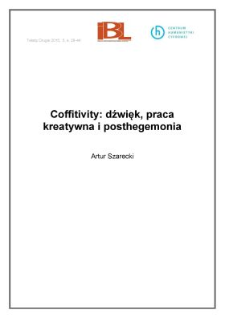- Search in all Repository
- Literature and maps
- Archeology
- Mills database
- Natural sciences
Advanced search
Advanced search
Advanced search
Advanced search
Advanced search

Object
Title: Coffitivity: dźwięk, praca kreatywna i posthegemonia
Subtitle:
Publisher:
Place of publishing:
Description:
21 cm ; Pol. text, eng. summary
Type of object:
References:
1. Alter, D. Oppenheimer, Effects of fluency on psychological distance and mental construal (or Why New York is a large city, but New York is a civilized jungle), „Psychological Science” 2008 nr 19, s. 161-167.
https://doi.org/10.1111/j.1467-9280.2008.02062.x
2. M. Augé, Nie-miejsca. Wprowadzenie do antropologii hipernowoczesności, PWN, Warszawa 2010.
3. J. Beasley-Murray, Posthegemony. Political theory and Latin America, University of Minnesota Press, Minneapolis 2010.
4. K. Bijsterveld, Mechanical sound: technology, culture, and public problems of noise in the twentieth century, The MIT Press, Cambridge and London 2008.
https://doi.org/10.7551/mitpress/9780262026390.001.0001
5. P. Clough, The affective turn. Political economy, biomedia and bodies, „Theory, Culture, and Society” 2008 nr 25(1), s. 1-22.
6. S. Connor, The modern auditory I, w: Rewriting the self: histories from the Renaissance to the present, red. R. Porter, Routledge, London and New York 1997.
7. Cowan, The social life of coffee. The emergence of the British coffeehouse, Yale University Press, New Haven and London 2005.
8. Ch. Cox, Beyond representation and signification: toward a sonic materialism, „Journal of Visual Culture” 2011 nr 10(2), s. 145-161.
9. J. Crary, 24/7. Późny kapitalizm i koniec snu, Karakter, Kraków 2015.
10. M. Ellis, The coffee-house. A cultural history, Widenfeld and Nicolson, London 2004.
11. V. P. Glăvenau, Distributed creativity, Springer, Cham et al. 2014.
12. S. Goodman, Sonic warfare. Sound, affect, and the ecology of fear, The MIT Press, Cambridge and London 2010.
13. Habermas, Strukturalne przeobrażenia sfery publicznej, przeł. W. Lipnik, M. Łukasiewicz, PWN, Warszawa 2007.
14. Hardt, Praca afektywna, „Kultura Współczesna” 2012 nr 3(74), s. 83-93.
15. Kassabian, Ubiquitous listening: affect, attention, and distributed subjectivity, University of California Press, Berkeley et al. 2013.
16. Korczynski, K. Jones, Instrumental music? The social origins of broadcast music in British factories, „Popular Music” 2006 nr 25(2), s. 145-164.
17. LaBelle, Acoustic territories. Sound culture and everyday life, Continuum, New York and London 2010.
18. J. Lanza, Elevator music. A surreal history of Muzak, easy-listening, and other moodsong, Picador USA, New York 1994.
19. S. Lash, Power after hegemony, „Theory, Culture and Society” 2007 nr 24(3), s. 55-78.
20. McWilliams, Flat white economy, Duckworth Overlook, London and New York 2015.
21. R. Mehta, R. Zhu, A. Cheema, Is Noise Always Bad? Exploring the Effects of Ambient Noise on Creative Cognition, „Journal of Consumer Research” 2012 nr 39(4), s. 784-799.
22. O’Callaghan, Sounds. A philosophical theory, Oxford University Press, Oxford 2007.
23. K. Sawyer, Explaining creativity, Oxford University Press, Oxford 2012.
24. W. Schrimshaw, Non-cochlear sound. On affect and exteriority, [w:] Sound, music, affect, red. M. Thompson, Ian Biddle, Bloomsbury, London et al. 2013.
25. Sennett, Upadek człowieka publicznego, przeł. H. Jankowska, Muza, Warszawa 2009.
26. J. Sterne, Sounds like the mall of America. Programmed music and the architectonics of commercial space, „Ethnomusicology” 1997 nr 41(1), s. 22-50.
27. N. Thrift, Non-representational theory. Space, politics, affect, Routledge, London and New York 2008.
28. Thompson, The soundscape of modernity, The MIT Press, Cambridge and London, 2002.
29. Williamson, You are the music. How music reveals what it means to be human, Icon Books, London 2014.
Relation:
Issue:
Start page:
End page:
Detailed Resource Type:
Format:
Resource Identifier:
oai:rcin.org.pl:64975 ; 10.18318/td. ; 0867-0633
Source:
IBL PAN, call no. P.I.2524 ; click here to follow the link
Language:
Language of abstract:
Rights:
Terms of use:
Copyright-protected material. May be used within the limits of statutory user freedoms
Digitizing institution:
Institute of Literary Research of the Polish Academy of Sciences
Original in:
Library of the Institute of Literary Research PAS
Access:
Object collections:
- Digital Repository of Scientific Institutes > Partners' collections > Institute of Literary Research PAS > Serials
- Digital Repository of Scientific Institutes > Literature > Journals/Articles
Last modified:
Oct 2, 2020
In our library since:
Mar 8, 2018
Number of object content downloads / hits:
1159
All available object's versions:
https://rcin.org.pl./publication/81031
Show description in RDF format:
Show description in RDFa format:
Show description in OAI-PMH format:
| Edition name | Date |
|---|---|
| Szarecki A. - Coffitivity: dźwięk, praca kreatywna i posthegemonia | Oct 2, 2020 |
Objects Similar
Stander, P. E. Ghau Tsisaba, D.
Smith, J. C.
Hastings, K. K. Testa, J. W. Rexstad, E. A.

 INSTYTUT ARCHEOLOGII I ETNOLOGII POLSKIEJ AKADEMII NAUK
INSTYTUT ARCHEOLOGII I ETNOLOGII POLSKIEJ AKADEMII NAUK
 INSTYTUT BADAŃ LITERACKICH POLSKIEJ AKADEMII NAUK
INSTYTUT BADAŃ LITERACKICH POLSKIEJ AKADEMII NAUK
 INSTYTUT BADAWCZY LEŚNICTWA
INSTYTUT BADAWCZY LEŚNICTWA
 INSTYTUT BIOLOGII DOŚWIADCZALNEJ IM. MARCELEGO NENCKIEGO POLSKIEJ AKADEMII NAUK
INSTYTUT BIOLOGII DOŚWIADCZALNEJ IM. MARCELEGO NENCKIEGO POLSKIEJ AKADEMII NAUK
 INSTYTUT BIOLOGII SSAKÓW POLSKIEJ AKADEMII NAUK
INSTYTUT BIOLOGII SSAKÓW POLSKIEJ AKADEMII NAUK
 INSTYTUT CHEMII FIZYCZNEJ PAN
INSTYTUT CHEMII FIZYCZNEJ PAN
 INSTYTUT CHEMII ORGANICZNEJ PAN
INSTYTUT CHEMII ORGANICZNEJ PAN
 INSTYTUT FILOZOFII I SOCJOLOGII PAN
INSTYTUT FILOZOFII I SOCJOLOGII PAN
 INSTYTUT GEOGRAFII I PRZESTRZENNEGO ZAGOSPODAROWANIA PAN
INSTYTUT GEOGRAFII I PRZESTRZENNEGO ZAGOSPODAROWANIA PAN
 INSTYTUT HISTORII im. TADEUSZA MANTEUFFLA POLSKIEJ AKADEMII NAUK
INSTYTUT HISTORII im. TADEUSZA MANTEUFFLA POLSKIEJ AKADEMII NAUK
 INSTYTUT JĘZYKA POLSKIEGO POLSKIEJ AKADEMII NAUK
INSTYTUT JĘZYKA POLSKIEGO POLSKIEJ AKADEMII NAUK
 INSTYTUT MATEMATYCZNY PAN
INSTYTUT MATEMATYCZNY PAN
 INSTYTUT MEDYCYNY DOŚWIADCZALNEJ I KLINICZNEJ IM.MIROSŁAWA MOSSAKOWSKIEGO POLSKIEJ AKADEMII NAUK
INSTYTUT MEDYCYNY DOŚWIADCZALNEJ I KLINICZNEJ IM.MIROSŁAWA MOSSAKOWSKIEGO POLSKIEJ AKADEMII NAUK
 INSTYTUT PODSTAWOWYCH PROBLEMÓW TECHNIKI PAN
INSTYTUT PODSTAWOWYCH PROBLEMÓW TECHNIKI PAN
 INSTYTUT SLAWISTYKI PAN
INSTYTUT SLAWISTYKI PAN
 SIEĆ BADAWCZA ŁUKASIEWICZ - INSTYTUT TECHNOLOGII MATERIAŁÓW ELEKTRONICZNYCH
SIEĆ BADAWCZA ŁUKASIEWICZ - INSTYTUT TECHNOLOGII MATERIAŁÓW ELEKTRONICZNYCH
 MUZEUM I INSTYTUT ZOOLOGII POLSKIEJ AKADEMII NAUK
MUZEUM I INSTYTUT ZOOLOGII POLSKIEJ AKADEMII NAUK
 INSTYTUT BADAŃ SYSTEMOWYCH PAN
INSTYTUT BADAŃ SYSTEMOWYCH PAN
 INSTYTUT BOTANIKI IM. WŁADYSŁAWA SZAFERA POLSKIEJ AKADEMII NAUK
INSTYTUT BOTANIKI IM. WŁADYSŁAWA SZAFERA POLSKIEJ AKADEMII NAUK


































